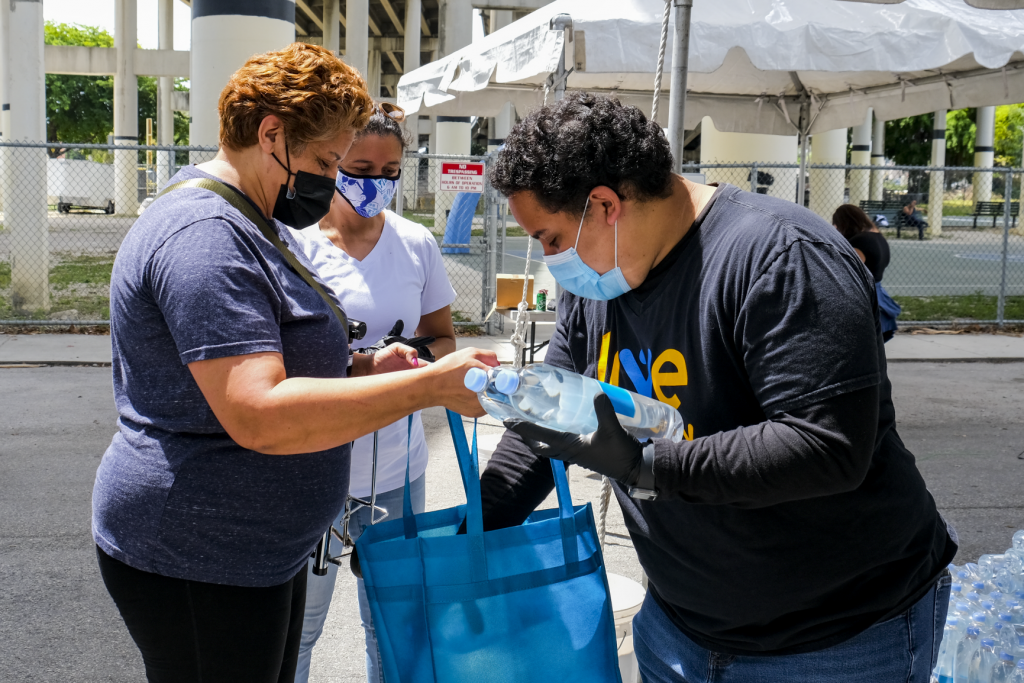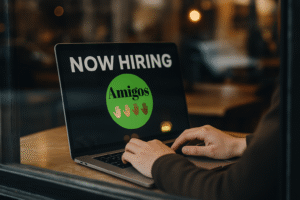By Livio Zanardo
The early onsets of the COVID-19 pandemic brought local economies to a sudden halt. Among the most affected were individuals and small businesses that relied on the clientele that was then mandated to stay at home in the name of public safety. A two-week lockdown dragged on for months, and residents and small businesses were scrambling to find whatever resources they could get their hands on to endure the mass closures of the pandemic.
The silver lining of every crisis is that there are always helpers rising to the challenges of the times. As the pandemic was coming to life for Miami Dade County, Axis Helps Miami wanted to get the financial resources that residents and small businesses needed in the community.
“As a community, when Federal aid is available we capture some of it, but we don’t always do a great job of sending it to the most vulnerable and have them benefit from those resources,” says Marta Viciedo, Co-Founder and Executive Director of the Urban Impact Lab and the lead of Axis Helps. “We wanted to get the financial resources that individuals and small businesses need in the community.” That is when she put together AxisHelps.org, a Civic Technology platform that connects Miami-Dade residents and small business owners to the resources they need to overcome today’s challenges and emerge with stability and strength.
Marta Viciedo, Executive Director of Urban Impact Lab and leader for Axis Helps Miami
COVID was the catalyst for a civic tech solution
The pandemic gave a spotlight to the problems that existed before, among them the difficulty involved in accessing alternative sources of financial assistance for residents and small businesses during a time of crisis. “The ability to access funding is a big issue for small businesses,” adds Viciedo,” as a lot of small business owners don’t know how to access the world of finance, how to get loans, and what organizations other than banks are focused on lending to minority owned businesses.”
In the greater scope of the modern technology era, Axis Helps Miami falls under the umbrella of Civic Technology, which represents solutions designed for improving access to social services, facilitating citizen and government feedback, or supporting civic engagement around issues of public concern. The process of creating Civic Technology focuses on the impact the technology has on residents, municipalities, and governments, rather than the market-driven approach championed in Silicon Valley over the years.
This focus on impact puts the user and their problems at the center, Viciedo said. “The customer is the starting point for how we structure our platform. We’re thinking of people that are in a crisis situation, and even if they’re not in a crisis but navigating through daily challenges, we make it really simple for them to select resources depending on their needs.”
Axis Helps Miami’s has two major components for impact. The first is a data component, where Axis organizes and analyzes existing data around residents and small businesses to design solutions that will better connect them to opportunities for specific industry or social challenges. “We can’t solve a problem we don’t understand. We need to know exactly where they are, what their composition is, the industry they work in, or else we’re building a solution searching for a problem to solve,” says Viciedo.
The other component of Axis Helps’ impact is partnerships with local institutions also serving, or interested in working with, residents and small businesses. For example, through a partnership with South Florida Anchor Alliance, Axis created an Anchor Alliance Toolkit to enable small businesses with the right knowledge and resources to work with large institutions like Florida International University, City of Miami Gardens, and Dade County. The organization also launched a housing assistance portal in partnership with Miami Homes For All, and with the help of other local non-profits they have translated these resources into Spanish and Haitian Creole.
The impact
Axis Helps Miami received seed funding from Microsoft Philanthropies and Citi Group, and with the help of the Civic Tech startup, Miami-Dade County facilitated over $14 million in small business loans and experienced an 525% increase in applications for local financial resources, spanning over 1,200 businesses and 12,850 households. Readers can read more about Axis Helps’ impact to date in its April 2021 impact report.
“We are very much open for business,” says Viciedo. “We build navigable tools that match the needs for residents and small businesses. It’s not only the individuals who find these solutions useful, but also the case workers in organizations providing services for their target demographics.”
Viciedo emphasizes that Axis Helps’ success has not been driven by free market forces, but rather by a great deal of relationship building and community outreach, as it is usually the case with Civic Technology.
“We can build a custom toolkit and technology solutions, but there is data and outreach that marries the digital and the analog,” Viciedo said. “In this particular realm, it is the people work that enables the solution to be actually useful.”
Axis Helps’ Cathy Dos Santos Alves canvasses small businesses. Photo by David Carson for Axis Helps
READ MORE ON REFRESH
Civic hackers and the future of the tech workforce
3 impact areas for a better South Florida
General Catalyst launches civic tech vertical, chooses Miami as HQ







 Noticias Newswire
Noticias Newswire 
